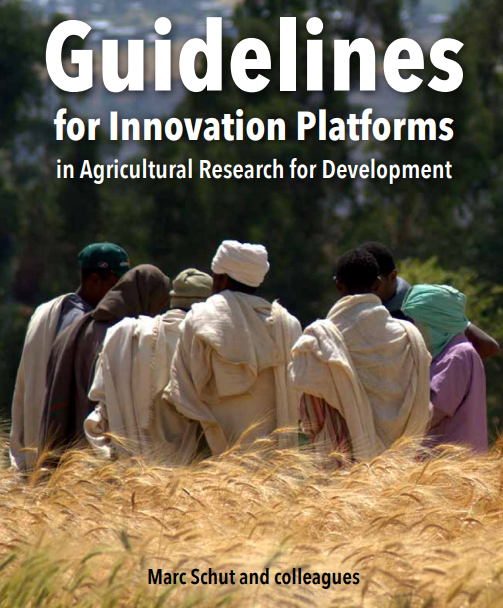Guidelines for Innovation Platforms in Agricultural Research for Development


The Guidelines are available from the website of the CGIAR Research Program on Roots Tubers and Bananas (RTB).
Marc Schut from the CGIAR International Institute of Tropical Agriculture (IITA) and Wageningen University (WUR) recently published a book with "Guidelines for Innovation Platforms in Agricultural Research for Development "- on how to design, budget and implement impactful Innovation Platforms for research, development and funding agencies. This essay highlights the main findings from the Guidelines.
This work was carried out under the framework of the Consortium for Improving Agricultural Livelihoods in Central Africa (CIALCA) that is funded by the Belgian Directorate General for Development Cooperation and Humanitarian Aid (DGD). CIALCA forms part of the CGIAR Research Program on Roots, Tubers and Bananas (RTB). |
Innovation Platforms are increasingly being proposed in agricultural research for development projects and programmes since they provide space to farmers, agricultural service providers, researchers, private sector and other stakeholders to jointly identify, analyse and overcome constraints to agricultural development.
Even though - according to the authors opinion - there is a risk that Innovation Platforms are promoted as a panacea for all problems in the agricultural sector. Therefore, we need to think more critically about when, how and in what form Innovation Platforms can meaningfully contribute to agricultural development impacts.
The “Guidelines for Innovation Platforms in Research for Development” addresses this issue. In total 12 of the 15 CGIAR centres provided input to this publication.
In particular, the Guidelines aim to support agricultural research for development (AR4D) parties in:
- Reflecting on when and under what conditions Innovation Platforms are an appropriate mechanism to foster collective action and innovation for resolving agricultural development problems and capitalizing on opportunities;
- Designing Innovation Platforms, including the definition of realistic goals, mechanisms, timelines, commitments, outcomes and impact measurement;
- Allocating necessary resources, creating the favourable conditions required for the effective implementation of Innovation Platforms, and developing metrics to assess their impact.
Some of the key findings from the Guidelines include:
- The composition of Innovation Platforms should be tailored to the platform’s specific innovation objective;
- To contribute to impact at scale, Innovation Platforms need to be firmly embedded in or linked to public/ private extension channels;
- A certain degree of flexibility in AR4D organizations to respond to (changing) stakeholder needs and interests is required;
- Mapping the costs of Innovation Platforms is an important first step towards conducting cost-benefit analysis.
The Guidelines provide information on key design and implementation principles, the financial and human resources needed, and it makes proposals for more effective monitoring, evaluation and learning. The Guidelines also contain:
- Reference materials,
- Frequently Asked Questions and
- A decision support tool for research, development and funding agencies.
Source:
Schut, M., Andersson, J.A., Dror, I., Kamanda, J., Sartas, M., Mur, R., Kassam, S., Brouwer, H., Stoian, D., Devaux, A., Velasco, C., Gramzow, A., Dubois, T., Flor, R.J., Gummert, M., Buizer, D., McDougall, C., Davis, K., Homann-Kee Tui, S., Lundy, M., 2017. Guidelines for Innovation Platforms in Agricultural Research for Development. Decision support for research, development and funding agencies on how to design, budget and implement impactful Innovation Platforms. International Institute of Tropical Agriculture (IITA) and Wageningen University (WUR) under the CGIAR Research Program on Roots Tubers and Bananas (RTB), Kigali, Rwanda. pp 87.
_________________________________________________________________________________________________________________
Related content:
Phil Thornton, Tonya Schuetz, Wiebke Förch, Laura Cramer, David Abreu , Sonja Vermeulen and Bruce Campbell: Responding to global change: A theory of change approach to making agricultural research for development outcome-based. Agricultural Systems 152:145–153, 10 Jan 2017. http://dx.doi.org/10.1016/j.agsy.2017.01.005

